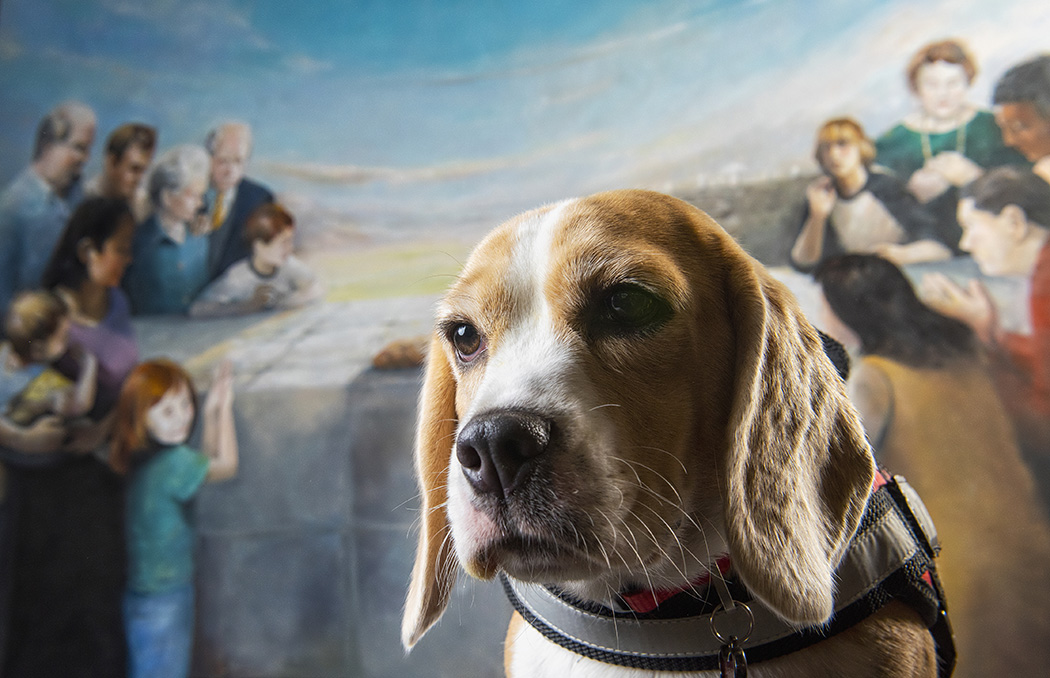
Photo by Danny Fulgencio.
Animals are such agreeable friends,” mused novelist George Eliot. “They ask no questions; they pass no criticisms.”
Studies show they also have the power to lower our blood pressure, reduce our anxiety and increase our level of oxytocin, a hormone that helps us feel happy and trusting. Fortunately, therapy dogs and their humans live right here in our neighborhood.
First there’s Hope. Literally. Hope is a beagle who serves the clients at the Grief and Loss Center, housed in, though not affiliated with, Wilshire Baptist Church on Abrams. The nonprofit offers individual and group support to anyone who has lost a loved one. “Coming here is hard,” says Executive Director Laurie Taylor. “But Hope helps people relax, open up and feel at home.”
Hope was just 4 months old when she saw her first client, and she proved to be a natural. A young woman whose mom had suddenly died came to the center to meet with Taylor. She first sat with Hope on the couch and then moved to the floor to play with the dog while she expressed her disbelief and grief. When the woman began to cry, Hope stopped playing and sat in the client’s lap, cuddling and burying her head. As the client continued to talk about her mom, she stroked Hope’s ears while the dog fell asleep in her lap. Even though Hope is an active puppy, she remained in that position until the client stood to leave and then followed her to the door to say goodbye.
The young beagle with the soulful eyes is present for every session. She has comforted all ages, from toddlers to 90-year-olds. She has helped folks work through grief from suicides, homicides, accidents and natural deaths. Interestingly, she seems to consistently follow her own internal, intuitive script: first, engage in play; indulge petting; become still and quiet when the tears flow; place head on person’s legs; curl up in their lap.
Of course, Hope is popular with the children who attend support groups. She senses when it’s time for the children to arrive and waits for them by the elevator.
“When the elevator opens, we often think Hope’s tail is going to fall off because she wags it so quickly,” Taylor says. “She knows the children are going to give her lots of pats and belly rubs.”
Taylor says Hope offers clients not only the physical touch of a living being, but also unconditional love and acceptance. There’s no judgment about how people grieve.
“I think anyone who is an animal lover knows just how much they can help us emotionally, mentally and physically.”
Another East Dallas agency, Dallas Children’s Advocacy Center, uses the healing power of canines to help abused children. Volunteer Karen Woltman recounts how her previous therapy pup, Tusko, sat with children during therapy sessions. Current dog, Dallas, does the same.
Canines are also helpful when a child is interviewed to determine if abuse occurred. In addition, therapy dogs can be helpful during court proceedings when children give testimony.
“The dog, just with his or her presence, can lend support to the child during a process that can be very scary and intimidating,” she says.
Advocacy center therapists use dogs to teach children coping skills, such as assertiveness. The dog plays a role by being “trained” by the child to respond to simple commands, such as “sit.” The process builds the child’s self-esteem and confidence.
Lakewood Heights neighbors Shea and Katie Putnam know firsthand the support their therapy dog, Cannoli, has provided to a child at the center. Here’s what a young girl wrote about Cannoli: “If it weren’t for him, I don’t think I would have made it through this.”
Therapy dogs can also be helpful to those struggling with mental illness. Junius Heights resident Lora Brown has visited mental health facilities with her dog, Beejay, a black-mouth cur. He offered support to patients dealing with depression, suicide attempts and other difficulties.
Though dogs can be therapeutic to those dealing with grief, trauma and mental illness, they are equally helpful in educational settings. Lakewood Heights neighbor Ellen Aster Bruder is a reading specialist at a suburban elementary school and is accompanied each day by Tucker, her golden retriever.
“I bring him to school with me, and my reluctant readers read to him,” she says.
Brown says, “I think anyone who is an animal lover knows just how much they can help us emotionally, mentally and physically. Being able to give some of that to others and make a difference is amazing.”
For more information, visit: dcac.org and mygriefandloss.org.





